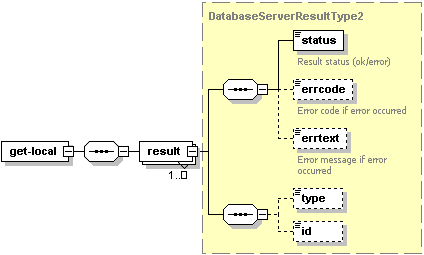Retrieving Local Database Servers Info
Use the get-local operation to retrieve info on local database servers of the specified type. You can retrieve preferences of multiple local database servers in a single packet.
Request Packet Structure
A request XML packet retrieving a local database server info includes the get-local operation node:
<packet>
<db_server>
<get-local>
...
</get-local>
</db_server>
</packet>
The get-local node has the following graphical representation:

Note: The interactive schema navigator for all request packets is available here: http://plesk.github.io/api-schemas/1.6.9.1/agent_input.svg.
- The filter node is required. It specifies the filtering rule. Data type: none.
- The type node is optional. It specifies the type of local database servers. Data type: string. Allowed values: mssql | mysql | postgresql.
Note: If the filter node is left blank (<filter/>), the operation will return info on all local database servers.
A single operation can retrieve the data of multiple database servers. Add as many different type parameters as the number of local database servers info on which you want to retrieve.
<db_server>
<get-local>
...
</get-local>
...
<get-local>
...
</get-local>
</db_server>
Response Packet Structure
-
The get-local node of the output XML packet is structured as follows:
Note: The interactive schema navigator for all response packets is available here: http://plesk.github.io/api-schemas/1.6.9.1/agent_output.svg.
- The result node is required. It wraps the response retrieved
from the server. Data type: DatabaseServerResultType
(
database_output.xsd). - The status node is required. It specifies the execution status of the get-local operation. Data type: string. Allowed values: ok | error.
- The errtext node is optional. It returns the error message if the get-local operation fails. Data type: string.
- The errcode node is optional. Is returns the error code if the get-local operation fails. Data type: integer.
- The type node is required. It returns the type of the database server. Data type: string.
- The id node is optional. It returns the ID of the database server. Data type: integer.
Retrieving info on a single database server
This request packet retrieves info on the MySQL local database server.
<packet>
<db_server>
<get-local>
<filter>
<type>mysql</type>
</filter>
</get-local>
</db_server>
</packet>
Response:
<packet>
<db_server>
<get-local>
<result>
<status>ok</status>
<type>mysql</type>
<id>1</id>
</result>
</get-local>
</db_server>
</packet>
If the type of database server was invalid, the response from the server looks as follows:
<packet>
<db_server>
<get-local>
<result>
<status>error</status>
<errcode>14007</errcode>
<errtext>Unsupported database type</errtext>
<type>NewSQL</type>
</result>
</get-local>
</db_server>
</packet>
Retrieving info on multiple database servers
This request packet retrieves info on all local database servers.
<packet>
<db_server>
<get-local>
<filter/>
</get-local>
</db_server>
</packet>
Response:
<packet>
<db_server>
<get-local>
<result>
<status>ok</status>
<type>mysql</type>
<id>1</id>
</result>
<result>
<status>ok</status>
<type>postgresql</type>
<id>2</id>
</result>
</get-local>
</db_server>
</packet>
